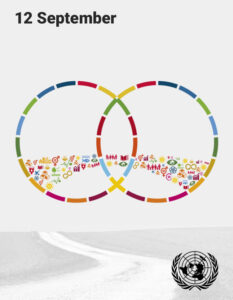United Nations South-South-Cooperation Day
By Sharon Schweitzer
This year’s theme for the United Nations Day is “Solidarity, Equity and Partnership: Unlocking South-South Cooperation to Achieve the SDGs”.
The UN history of South-South cooperation dates back to 1949 with the establishment of the first UN technical aid programme by the Economic and Social Council and the creation of the United Nations Development Programme (UNDP) in 1965.
In 1974, the United Nations General Assembly endorsed “the establishment of a special unit within the United Nations Development Programme (UNDP) to promote technical co-operation among developing countries.” This special unit would become the United Nations Office for South-South Cooperation (UNOSSC), the main office tasked to coordinate South-South and triangular cooperation globally and within the UN system.
In 1978 the conference of the Global South on TCDC was held in Buenos Aires, resulting in the adoption of the Buenos Aires Plan of Action (BAPA) for Promoting and Implementing Technical Cooperation among Developing Countries (TCDC), one of the main pillars for South-South cooperation. With this endorsement, the Special Unit was strengthened in order to fulfill its primary mandate, set forth in BAPA. Finally, in 2013, this Unit would be renamed the United Nations Office for South-South Cooperation (UNOSSC), as we know it today.
Another milestone was set in 2009 during the High-level UN Conference on South-South Cooperation held in Nairobi, Kenya. At this conference, participants produced the Nairobi outcome document, highlighting the roles that national governments, regional entities and UN agencies have to play in supporting and implementing South-South and triangular cooperation.
After the adoption of the 2030 Agenda for Sustainable Development in 2015, the General Assembly convened in 2019 the second high-level United Nations conference on South-South cooperation (BAPA+40) on the occasion of the fortieth anniversary of the adoption of the Buenos Aires Plan of Action.
This type of collaboration strengthens the alliance around the globe. For businesses, this also promotes future partnerships that allow and ease innovation, technical advancements, and trade opportunities.
Photo by UNOSSC
Sharon Schweitzer, J.D., is a cross-cultural trainer, modern manners expert, and the founder of Access to Culture. In addition to her accreditation in intercultural management from the HOFSTEDE Centre and the Intercultural Communication Institute, she serves as a Chinese Ceremonial Dining Etiquette Specialist in the documentary series Confucius was a Foodie, on Nat Geo People. Her Amazon #1 Best Selling book in International Business, Access to Asia: Your Multicultural Business Guide, now in its third printing, was named to Kirkus Reviews’ Best Books. She’s a winner of the British Airways International Trade Award at the Greater Austin Business Awards.
#SharonSchweitzer, #AccesstoCulture, Access2Culture, #InternationalCelebration, #AccesstoAsia, #GlobalEtiquette, #Cross-CulturalTrainer, #InterculturalCommunication, #InternationalCommunication, #Interculturalist, #Etiquette, #CultureExpert, #Speaker, #KeynoteSpeaker, #CulturalIntelligence, #Culture, #UnitedNations, #cooperation, #partnership, #southsouth, #UNOSSC, #Kenya, #development #technicalaide, #BuenosAires


Leave A Comment